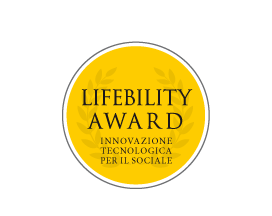LB8P_042_ InterpretApp
Per partecipare al concorso i progetti vanno inviati entro:
Progetto proposto da Giulia Martina Nobile
InterpretApp – disintermediare il mondo dell’interpretariato.
L’idea si sviluppa assistendo a discussioni e chiacchierate informali fra interpreti che lavorano sia nel pubblico che per privati a Milano e provincia.
Ad oggi gli interpreti sono figure necessarie nella vita pubblica dell’individuo non fluente in italiano; il servizio è sovente erogato dallo Stato, ma senza una organizzazione propria per la gestione di questo servizio che rimane in mano a soggetti privati, intermediari/agenzie di vecchio stampo. Se questa mancanza è comprensibile per i soggetti che hanno saltuariamente bisogno del servizio di interpretariato, lo è meno per coloro che necessitano di questi servizi costantemente e con larga prevedibilità. Questo vale sia per soggetti pubblici che privati – molti dei quali agiscono in vece dello Stato, in bando pubblico. Non si nega la necessità di intermediari retribuiti per il servizio offerto, ma si ritengono quelli esistenti attori non efficienti (bassa meccanizzazione/automazione dei processi, alta necessità di azione umana nella filiera), dunque una fetta di risorse ivi allocate potrebbero essere spostate altrove. Il progetto tuttavia non si riduce ad un mero strumento per mettere in contatto domanda con offerta – altrimenti non sarebbe tanto diverso dalle tante piattaforme già presenti online. Si differenzia per le altre funzionalità offerte, e per il fatto di essere modellato sulle esigenze esistenti in questo campo nella realtà italiana. La finalità perseguita è la creazione di uno strumento ed un servizio che renda più diretto e meno oneroso il rapporto con l’interprete. Si vuole razionalizzare il campo dell’interpretariato, attraverso l’introduzione delle nuove tecnologie. I beneficiari principali sarebbero lo Stato ed enti pubblici, associazioni, soggetti economicamente deboli non madrelingua. Cfr. “Benefici per la città Innovatività e originalità”. Il bisogno del datore è di poter usufruire dei servizi di interpretariato in una delle decine di lingue esistenti senza dover gestire la trafila necessaria, dal riuscire a procurarsi il contatto di un soggetto idoneo fino all’assolvimento degli oneri fiscali; per la Pubblica Amministratore, questa esigenza si ripresenta quotidianamente in innumerevoli istanze (tribunale, prefettura, questura, anagrafe, ospedale). Con l’utilizzo del programma creato ad hoc, il datore opera in autonomia grazie alla interfaccia intuitiva; specificando i dettagli della richiesta – come lingua, data, luogo – viene associato ad un prestatore secondo criteri interni e preferenze espresse dalle parti. Per il prestatore, il programma diventa strumento di gestione del lavoro: vi gestisce direttamente gli incarichi, accettando o rifiutandoli, selezionando i giorni in cui è disponibile dunque vuole ricevere proposte… in sintesi velocizzando la filiera. Il progetto partirebbe da Milano e provincia ma verrebbe allargato anche al di fuori, poiché quelle descritte sono esigenze presenti ovunque. Per la realizzazione sono necessarie competenze informatiche, legali e dell’ambito: non presenti nel team, ma di agevole reperimento.
This idea grew witnessing and listening to informal chats and discussions taking place among professional interpreters that work in Milan and its province. As of today, interpreters are a necessity for all of those who are not fluent in Italian; the service is often provided by the State, though without an organization of its own to manage this service, which is a responsibility left to private entities, intermediaries or agencies. While this failure to automanage is understandable for those who need an interpreter only from time to time, the same cannot be said for those who need these services regularly and constantly. This is true both for public and private entities – and the majority of the latter usually follow the instructions given during a public procurement procedure. However, this is not a project of a simple marketplace platform, similar to the already existing dozens. It is different thanks to the functionalities it offers, which are shaped on the needs and peculiarities of the Italian interpretation field. This abstract is not to be read as a declaration of futility of any kind of intermediary, which on the contrary are useful actors that provide a service that deserves remuneration. However, the existing players of this market segment are not efficient (low automation of processes, high human contribution needed), which means that a part of the resources could be allocated more effectively.
We aim at creating an instrument, which provides a service that makes more direct and less costly the
relationship with the interpreter. We want to apply new technologies to rationalize the field of interpreting services. Different categories would benefit from the implementation of this project: the State and public entities, associations, non wealthy individuals whose native language is not Italian. See “Impatto sociale, innovatività”.
The contractors’ needs can be boiled down to being able to receive interpretation services without going through the entire necessary rigmarole, from indentifying a fitting professional and obtaining its contact informations up to coping with fiscal duties. The PA faces this need everyday in multiple instances (e.g.: tribunals, prefectures, police headquarters, residents’ register services, hospitals…). With InterpretApp, the contractor can operate autonomously thanks to the intuitive interface; when he inputs the specifics of its request – such as required language, date, place – the software matches him with an interpreter according to internal criteria and any expressed preferences. For the supplier, the program becomes a useful tool: he checks the offered jobs, accepts or declines them, he selects the date when he’s available thus willing to accept an ofter, and so on. All of these functionalities can expedite the whole process, while at the same time minimizing the number of tasks the parties usually have to take upon themselves in order to reach an agreement. The project would be beta tested in Milan and its province, but its characteristics make it suitable for Italy in its entirety, and maybe also transnational markets, since it addresses general problems. IT skills and legal knowledge are crucial for a successful realization, along with a deep understanding of the field. These competencies are not currently available inside the team, but I have knowledge of where to find them.

